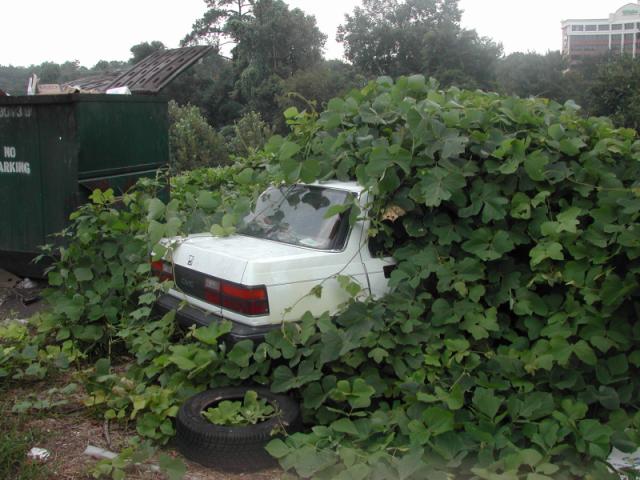
The vine that ate the South has a nasty case of gas…
University of Virginia researcher Manuel Lerdau and State University of New York scientist Jonathan Hickman believe that kudzu is emitting sizable amounts of ground-level ozone – potentially increasing smog, aggravating respiratory ailments and quickening the pace of global climate change.
“No one likes kudzu,” said Lerdau. “If we’re right, then it’ll be one more big reason to dislike kudzu.”
Did you know that the growth of kudzu is accelerated by watching reality TV?
Thanks, KB















Gee, another good source for biofuel.
Forgive my ignorance on the science of global warming. However, according to this study, kudzu is bad because it emits ozone. However, weren’t we worried about a hole in the ozone layer? Wasn’t that the cause of all that uproar a decade or so back?
Kudzu can be eaten by humans and animals. It also makes a great mulch.
People just need to use it and the problem would go away.
Cursor_
Like manure, ozone is valuable in the right place, very bad in the wrong place. Ground level ozone has no way to get up to where it belongs.
(Kind of funny they found a hole as soon as they developed a way to find the hole, and claim it was not there before they had a way to see if a hole was really there. How do they know it was not there before they looked?)
A plant giving off ozone, though? That needs cross checking because ozone is chemically nasty stuff that should be destroying the plant tissue.
Ozone resistant plant tissue is worth looking into.
Plants are now bad for the environment!??! Now I’ve heard everything…
If somebody come up with a way to turn Kudzu into bio-fuel they might as well have invented a perpetual motion machine.
The stuff will grow anywhere and fast.
Does this mean it would be good or bad to burn it all away?
If you like the looks of it then it sure as hell beats mowing the grass.
Most fast growth has a low dry weight, so kudzu’s not likely to be good for biofuel.
Angus, exotic plants can be /very/ bad for the environment, that includes more than just the atmosphere. This air pollution question needs more investigation, IMO.
I grew up in MS. On a hot summer day after a good rain, you can literally watch the kudzu grow. It’s like watching the minute hand on your watch.
#3
“Kudzu can be eaten by humans and animals.”
Yeah but we’re talking about the Southern USA where even rabbits prefer to eat steak.
Kudzu can be eaten by humans and animals. It also makes a great mulch.
Eat Or Be Eaten!
(let’s see if anyone catches that reference)
J/P=?
One of the reasons the damn stuff is all over the south, is that in the 1930s, Civilian Conservation Corp. workers and school kids were given plants and told to plant them anywhere they found soil erosion. I always thought stories of how fast Kudzu grew were exaggerated until a small patch of it popped up next to my driveway. The vine was about 6 inches onto the driveway when I left for work one morning. That afternoon when I returned the same runner had grown at least another 5 feet. I have not sampled Kudzu as a food, but a friend who tried it said it has a similar taste as an old copy of Sports Illustrated.
#4 “Like manure, ozone is valuable in the right place, very bad in the wrong place. Ground level ozone has no way to get up to where it belongs.”
Yet isn’t it odd that CFCs can? I wish some knowledgeable environmentalist could explain the mechanism to me.
“(Kind of funny they found a hole as soon as they developed a way to find the hole, and claim it was not there before they had a way to see if a hole was really there. How do they know it was not there before they looked?)”
An excellant observation.
“A plant giving off ozone, though? That needs cross checking because ozone is chemically nasty stuff that should be destroying the plant tissue.”
Actually, plants are a significant source of nitrous oxides, which react in sunlight to form ozone.
“Actually, plants are a significant source of nitrous oxides, which react in sunlight to form ozone.”
LOL, I just got back from the drug store and some more cough medicine has just been recalled for some reason. Next kids are going to be forbidden to sprawl on lawns for fear they will get high on Nitrous. Office house plants outlawed, secretaries getting high! (OTOH, that might explain …)